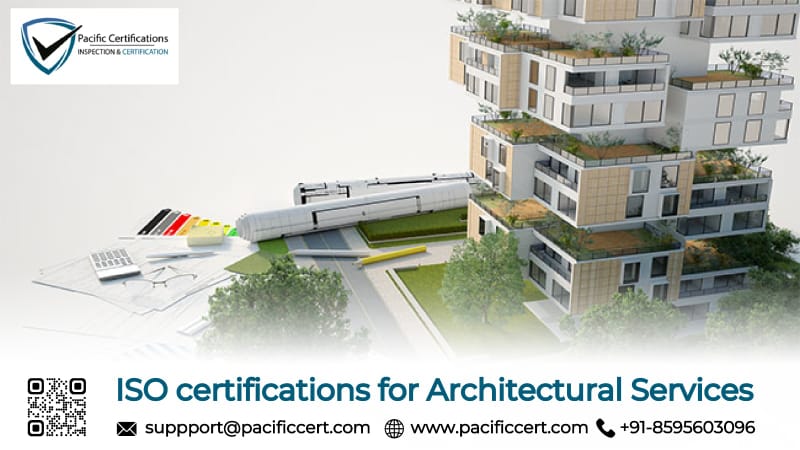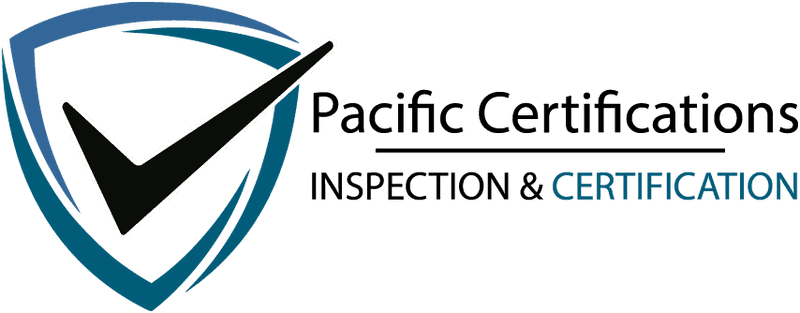ISO Certifications for Architectural Services, Requirements and Benefits

Architectural services play a crucial role in the construction and real estate industries, providing design, planning, and oversight services to ensure that buildings and infrastructure projects are aesthetically pleasing, functional, and safe.
To maintain high standards of quality, efficiency, and safety, these companies can benefit greatly from ISO certifications. These certifications demonstrate a commitment to industry best practices and continuous improvement, fostering trust among clients and stakeholders.
Applicable ISO Standards for Architectural Services
ISO 9001:2015 - Quality Management Systems: ISO 9001 is the most widely recognized quality management standard in the world. For architectural services, ISO 9001 certification leads to improved project management, better client relationships, and increased efficiency in operations.
ISO 14001:2015 - Environmental Management Systems: Sets out the criteria for an environmental management system and can be certified to, helps architectural firms demonstrate their commitment to sustainability and environmental stewardship, which is increasingly important in today’s market.
ISO 45001:2018 - Occupational Health and Safety Management Systems: ISO 45001 provides a framework to improve employee safety, reduce workplace risks, and create better, safer working conditions.
ISO 50001:2018 - Energy Management Systems: Supports organizations in all sectors to use energy more efficiently through the development of an energy management system.
ISO 19650 - Organization and digitization of information about buildings and civil engineering works, including building information modelling (BIM): ISO 19650 is a series of international standards for managing information over the whole life cycle of a built asset using building information modelling (BIM).
Click here to find out more applicable standards to your industry
How we can help
We at Pacific Certifications, specialize in providing rigorous and impartial auditing and certification services to help architectural services achieve and maintain ISO certifications. Our team of experienced auditors ensures that your organization meets the stringent requirements of the applicable ISO standards.
Our Process:
Initial Assessment: We begin with an initial assessment to understand your current management systems and identify any gaps that need to be addressed.
Audit Planning: We develop a tailored audit plan that outlines the scope, objectives, and schedule for the audit, ensuring a comprehensive evaluation of your processes.
Conducting the Audit: Our auditors conduct a thorough audit of your management systems, examining documentation, processes, and practices to verify compliance with the relevant ISO standards.
Reporting and Certification: Upon successful completion of the audit, we provide a detailed report highlighting any areas for improvement and issue the ISO certification, validating your commitment to excellence and continuous improvement
Market Trends
In this year, the architectural services industry is experiencing significant growth driven by the global emphasis on sustainable building practices and smart city initiatives. The adoption of green building standards and digital transformation, including the use of Building Information Modelling (BIM), is becoming increasingly prevalent.
As clients and stakeholders demand higher standards of quality, sustainability, and safety, ISO certifications are becoming essential for architectural firms to stay competitive and relevant in the market.
Achieving ISO certification is a strategic move for architectural services aiming to enhance their operational efficiency, client satisfaction, and market reputation.
We are dedicated to helping you navigate the certification process with professionalism and integrity. Contact us today at [email protected] to start your ISO certification journey!
Requirements & Benefits of ISO certifications for Architectural Services
ISO 9001:2015 - Quality Management Systems
Requirements:
- Develop and implement a QMS that meets the ISO 9001 standard requirements, including quality policy, objectives, and procedures.
- Maintain documentation to ensure consistency and traceability of processes and records.
- Identify and manage all processes that affect product and service quality.
- Regularly monitor, measure, and analyze key performance indicators to ensure the effectiveness of the QMS.
- Implement actions to address risks and opportunities, and continually improve the QMS.
Benefits:
- Deliver consistent quality, meeting or exceeding client expectations.
- Streamline processes, reducing waste and increasing efficiency.
- Demonstrate a commitment to quality, enhancing market reputation and client trust.
- Identify and mitigate risks systematically, ensuring project success.
ISO 14001:2015 - Environmental Management Systems
Requirements:
- Develop an environmental policy aligned with the organization's objectives and regulatory requirements.
- Identify and evaluate the environmental aspects and impacts of your operations.
- Ensure compliance with applicable environmental laws and regulations.
- Set measurable environmental objectives and targets to improve environmental performance.
- Provide training to employees to raise awareness about environmental issues and the EMS.
Benefits:
- Promote sustainable practices, reducing environmental impact.
- Achieve cost savings through efficient resource use and waste management.
- Ensure compliance with environmental laws, avoiding fines and legal issues.
- Enhance corporate image and attract environmentally conscious clients.
ISO 45001:2018 - Occupational Health and Safety Management Systems
Requirements:
- Develop a policy that outlines the commitment to providing a safe and healthy workplace.
- Identify hazards, assess risks, and implement control measures to mitigate them.
- Ensure compliance with occupational health and safety regulations.
- Provide necessary training and ensure employees are competent to perform their tasks safely.
- Investigate incidents to identify root causes and prevent recurrence.
Benefits:
- Create a safer workplace, reducing accidents and incidents.
- Improve employee morale and productivity by demonstrating a commitment to their well-being.
- Comply with health and safety laws, reducing legal risks.
- Lower costs associated with workplace accidents and illnesses.
ISO 50001:2018 - Energy Management Systems
Requirements:
- Establish an energy policy that supports the organization’s energy objectives.
- Conduct an energy review to identify significant energy uses and establish a baseline.
- Set energy objectives and targets based on the energy review.
- Develop action plans to achieve energy objectives and targets.
- Monitor and measure energy performance to track progress and identify areas for improvement.
Benefits:
- Improve energy efficiency, reducing consumption and costs.
- Support environmental sustainability by reducing greenhouse gas emissions.
- Achieve significant cost savings through better energy management.
- Enhance reputation by demonstrating a commitment to energy management and sustainability.
The architectural services industry in 2024 is seeing a significant shift towards sustainability and digital transformation. The adoption of green building practices and Building Information Modelling (BIM) is on the rise, driven by regulatory requirements and client demand for sustainable and efficient building solutions. ISO certifications are becoming increasingly important as firms seek to demonstrate their commitment to these trends and differentiate themselves in a competitive market.
Pacific Certifications is accredited by ABIS, in case you need support with ISO certification for your Architectural Services business, please contact us at [email protected] or +91-8595603096.
FAQ: ISO Certifications for Architectural Services and Applicable ISO Standards
What are ISO certifications?
ISO certifications are standards developed by the International Organization for Standardization (ISO) that ensure quality, safety, efficiency, and sustainability in various industries. They provide a framework for organizations to implement effective management systems.
Why are ISO certifications important for architectural services?
ISO certifications help architectural services companies demonstrate their commitment to quality, sustainability, and safety. They enhance operational efficiency, improve client satisfaction, and provide a competitive edge in the market.
Which ISO standards are most relevant for architectural services?
The most relevant ISO standards for architectural services companies include:
- ISO 9001:2015 - Quality Management Systems
- ISO 14001:2015 - Environmental Management Systems
- ISO 45001:2018 - Occupational Health and Safety Management Systems
- ISO 50001:2018 - Energy Management Systems
- ISO 19650 - Organization and digitization of information about buildings and civil engineering works, including Building Information Modelling (BIM)
What are the benefits of ISO 9001:2015 for architectural services?
ISO 9001:2015 helps architectural services enhance quality management, improve client satisfaction, streamline processes, and achieve operational efficiency. It also provides a framework for continuous improvement.
How does ISO 14001:2015 benefit architectural firms?
ISO 14001:2015 enables architectural firms to implement effective environmental management systems, reduce environmental impact, achieve cost savings through efficient resource use, and demonstrate a commitment to sustainability.
What is the purpose of ISO 45001:2018 for architectural services?
ISO 45001:2018 helps architectural services create a safer work environment, reduce workplace accidents, improve employee morale, and ensure compliance with health and safety regulations.
How can ISO 50001:2018 improve energy management for architectural firms?
ISO 50001:2018 provides a framework for improving energy efficiency, reducing energy consumption and costs, and minimizing environmental impact. It supports the implementation of effective energy management practices.
What is ISO 19650, and why is it important for architectural services?
ISO 19650 is a standard for managing information throughout the lifecycle of a building or civil engineering project using Building Information Modelling (BIM). It improves collaboration, reduces errors, and enhances project outcomes by ensuring precise and accurate information management.
How can architectural services achieve ISO certifications?
Architectural services can achieve ISO certifications by implementing the required management systems, undergoing a thorough audit by a certification body, and demonstrating compliance with the relevant ISO standards.
How can Pacific Certifications help with ISO certifications for architectural services?
At Pacific Certifications, we provide comprehensive audit and certification services. Our experienced auditors conduct thorough assessments to ensure your organization meets the stringent requirements of applicable ISO standards, helping you achieve and maintain ISO certifications.
Read More at: Blogs by Pacific Certifications
